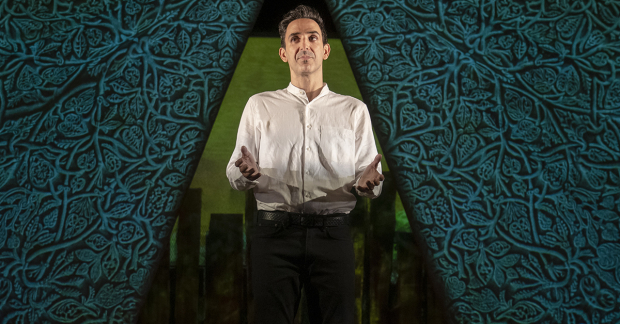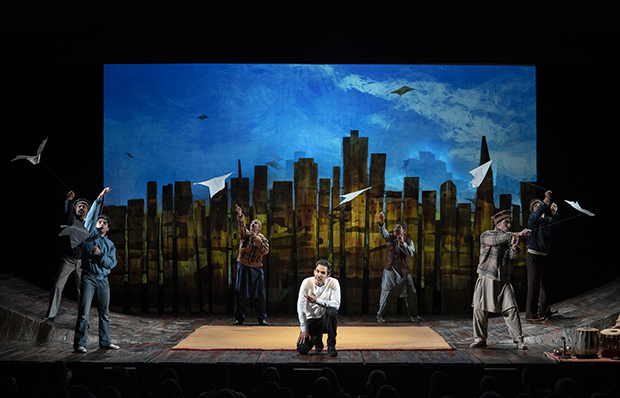Interview: Amir Arison on The Kite Runner: "One of the Greatest Honors of My Lifetime"
You can't blame Amir Arison for being a little nervous. This summer, it was announced that he was leaving his longtime TV home, the NBC show The Black List, having landed the role of a lifetime on Broadway. But the leading role in The Kite Runner at the Helen Hayes Theater is no walk in the park, onstage for pretty much the entire two-and-a-half hour show, narrating the Khaled Hosseini adaptation with huge, lengthy monologues, and playing a character who does a bad thing and spends the rest of his life regretting his actions.
But with nerves comes rewards, and Arison, now coming towards the end of the show's run, looks at it as one of the great honors of his life. Here, he tells us why.

(© Joan Marcus)
Your character is a difficult one: he does something bad to someone who is unwaveringly devoted to him, and yet he also must have the audience on his side for the entire time as the narrator. What was your way into it, and how has that shifted over the course of rehearsals to now months into the run?
That was a hurdle I immediately sensed when I first got the audition. It wasn't until the callback where I was able to fully find my way in, and the way in was love. The character, Amir, is not a sociopath. He is full of shame and guilt. He loves Hassan, but only understands that love as an adult after he has matured with time; he has been humbled through war, immigration, and poverty. He has so much love inside of him, but he doesn't know how to channel it. He is a motherless child, and an only child to a stern father who doesn't show love or affection in the way he yearns for it. When he doesn't save Hassan, he doesn't know he was at a crossroads in his life and his nature is not courageous. Further, he was born into great privilege, being taught that Hassan is his servant and a second class citizen. Only as an adult does he realize the inherent racism and class system he was participating in, but as a kid, he didn't give it thought.
When I did my own table read with a few friends before rehearsals started, I realized that the narrative monologues are where his bravery lies. In these monologues, he is admitting his faults, flaws, and shame. He is trying to seek redemption and doesn't know how to undo seemingly unforgivable mistakes. But in these monologues, he is actually taking the first step to forgiveness: admission of guilt. When someone tells him "there is a way to be good again," he accepts. That is actually how the play starts. He then charts his memories for the audience, asking them to understand his choices, even though they are shameful. That is the way to accept himself, and the way I approach bringing the audience with me on that journey.
Why did you decide to leave The Blacklist specifically to do The Kite Runner? Was there a specific turning point in your life or in the play itself that led you to it?
Technically I booked The Kite Runner before The Blacklist had been renewed. When The Blacklist came back for another season, I had already accepted that I was going to take on this new theatrical challenge. Another dream come true, Broadway, and in a role with my name. I had to take it. It was not without some trepidation because The Blacklist has been my family for nine seasons. But they were so supportive. I'll just say that Aram from The Blacklist is still alive and the door is open for a potential visit in season 10. I couldn't have scripted it better.

(© Joan Marcus)
How do you connect to this role, to this story, even though you are not Afghan yourself? Do you see parallels in the lives of your familial elders?
I feel so many intersections and micro human moments throughout.
Seeking his father's approval is an enormous engine for the character of Amir, and it's one that I still unconsciously seek to this day. My dad was hesitant about me becoming an actor and did not want me to go to acting school. My dad thought I could go to medical school and become a doctor. Baba doesn't want Amir to study creative writing, he wants him to go to medical school or law school. The echoes are uncanny. And to this day, there is nothing better than getting a role and sharing the news with my father. Him coming to opening night and giving me a big thumbs up after the curtain call was one of the greatest moments of my life. They are the most supportive parents in the world and they love that I followed my dreams.
In terms of Afghanistan, I recognize the enormous responsibility and did as much research and preparation as possible with accent, language, and culture. Humaira Ghilzai is our cultural consultant and a long-time friend, and her love and support and guidance were invaluable. My grandparents were Holocaust survivors who lost everything, including their entire families. They started over with nothing. I think of them every time Baba and I immigrate to America at the beginning of act two with nothing but two suitcases. I am flooded with gratitude at the sacrifices they made and all they had to endure.
When I was a kid growing up in Florida, I sometimes would be embarrassed at my name because kids didn't think I was American and I would mispronounce certain words like my parents did with their accents. I wanted to fit in. The character of Amir only wants to speak English in America and ignore his past. Only as I got older did I begin to understand the profound value of my parents' and grandparents' journeys that have allowed me this freedom and opportunity. The character of Amir has a very similar awakening in the second act.
What does it mean to make your Broadway debut in The Kite Runner?
I couldn't have asked for a better, more challenging role, and timely story for both America and Afghanistan. Our producers hit the zeitgeist. People always ask me if I'm totally drained after the show. My body is very tired, but my soul feels rejuvenated. A cleanse, a sense of having done something. Also, I've learned how connected the Broadway community is. We see each other's shows, send each other notes, and participate in campaigns as one. I'm hooked.
What's the most impactful thing you've heard from an audience member over the course of this run?
I've met so many wonderful people, and some begin to cry when we come out the stage door and we hug and share a moment. And there is no better feeling/feedback than when you meet Afghans after the play thanking us and crying and sharing personal stories and sometimes they even speak Dari to me, which I take as the highest compliment of all.
I just met a young gentleman, a Hazara Afghan who sought asylum, became a citizen, and is now at West Point. He thanked me, loved the story, and said he is proud to serve both countries. I feel like that is what we are doing in this play. We are serving both countries. It has been one of the great honors of my lifetime.











